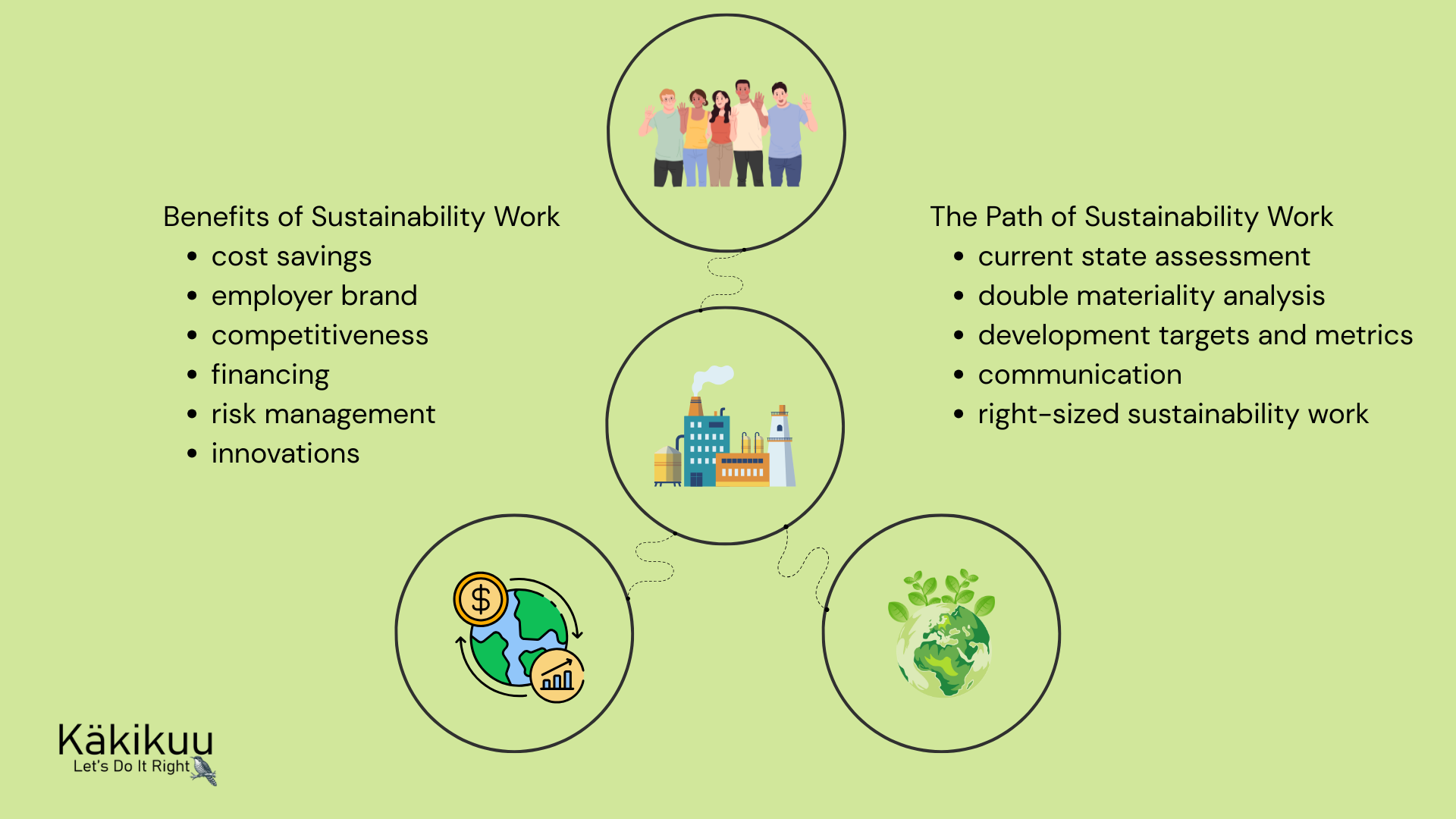Sustainability has emerged as one of the central themes in business and has become an essential part of a company’s competitiveness and viability. For small and medium-sized enterprises, this development is both a challenge and an opportunity. The impact of sustainability efforts sets the direction and milestones also for SMEs’ responsibility work.
Impact is the true measure of sustainability work. Without impact, responsibility remains superficial – beautiful words that change nothing. For SMEs, which often operate with limited resources, emphasizing impact is particularly important. They must focus on actions that truly matter – for business, stakeholders, and society at large.
Why Does Impact Matter?
The business of SMEs often relies heavily on trust. Customers, partners, and employees evaluate a company based on its actions. When sustainability measures are genuinely impactful – such as reducing emissions, improving working conditions, or increasing transparency – they build trust that lasts.
SMEs cannot afford to waste resources on superficial measures. Impact-oriented thinking helps direct limited resources to where they deliver the greatest benefit. This might mean improving energy efficiency, reducing waste, or developing practices that support both business and sustainable development.
EU regulation, such as the Corporate Sustainability Reporting Directive (CSRD) and the Deforestation Regulation, is rapidly reshaping the business environment. SMEs are increasingly required to demonstrate concrete actions. Impact is the key here: it shows that sustainability is not just about fulfilling obligations, but a strategic part of business.
Sustainability has become a matter of business survival. Investors, customers, and talent seek out companies with clear evidence of impactful actions. SMEs that build their sustainability efforts around impact are better prepared to face competition and secure their place in the market.
SMEs make up over 90% of all businesses and employ the majority of the workforce. Their combined influence on society, the environment, and the economy is enormous. Even if the actions of a single company may seem small, together they create a decisive force.
Even if the actions of a single company may seem small, together they create a decisive force.
How to Make Sustainability Work Impactful?
Impact does not happen by accident – it requires planning, goal-setting, and persistence. SMEs can make their sustainability work impactful by following a few core principles.
Sustainability must not remain an isolated project. It must start from the company’s values and core business. When sustainability work directly supports the business model – for example, production efficiency, customer satisfaction, or risk management – it becomes a natural part of the company’s operations.
Customers, employees, suppliers, and communities expect a lot from companies. Stakeholder dialogue helps to identify which sustainability measures are genuinely meaningful. This increases impact, because then the focus is on exactly those things that matter.
Without goals and metrics, it is impossible to evaluate impact. SMEs do not need to create complex reporting systems, but clear indicators – such as energy consumption per product, employee turnover, or customer satisfaction – help to monitor progress and communicate it.
Sustainability work is not a sprint but a marathon. Even small steps move things forward when they are carried out systematically and consistently. Impact grows over time as the company learns, improves its processes, and engages stakeholders.
Sustainability work is not a sprint but a marathon.
Impact only becomes visible when it is communicated. For SMEs, honest and open communication is important: reporting successes but also challenges. This increases credibility and trust.
Every company can be part of the solution
The impact of sustainability work will take on an increasingly central role. Technology provides new opportunities to measure and communicate impacts, and customer expectations are constantly growing. For SMEs, this means that sustainability can no longer be considered “extra work.” It is a necessary part of success.
Companies that focus on impact stand out. They attract talent, customers, and partners. They build a brand that endures. And most importantly: they are involved in solving the greatest challenges of our time – climate change, depletion of natural resources, and social inequality.
Impact is the core of sustainability work. For SMEs, it means directing limited resources correctly, integrating sustainability work into business, and engaging stakeholders in the journey.
The sustainability work of SMEs is a decisive factor in shaping our future. Every company can be part of the solution, and impact is the measure that makes real change visible.



